World leaders are currently assembling in Dubai to take vital decisions on climate commitments as part of COP28. While climate research is essential to inform decision-makers, it also has a carbon footprint of its own.
BAS Net Zero Leads, Nopi Exizidou and Dr Beatrix Schlarb-Ridley, explain what British Antarctic Survey is doing to reach Net Zero by 2040, and invite all of us to use our influence, however small or big that may be, to address the climate crisis.
 |
Parthena (Nopi) Exizidou – Head of Net Zero Transition
Nopi leads the BAS Net Zero team and the implementation of BAS Net Zero Strategy and contributes as an expert to the delivery of wider sustainability commitments at NERC and UKRI. |
|
 |
Dr Beatrix Schlarb-Ridley – Director of Innovation & Impact
Beatrix leads the Net Zero Strategy Group at BAS and works with innovators at BAS and at partner organisation’s on Net Zero solutions for polar research. |
Our planet is undergoing a period of unprecedented change, the rate and scale of which is unlike anything seen in human history. Research in the polar regions provides vital contributions to the IPCC, the authoritative scientific voice informing decision-making at COP28 UAE. But this research comes with a carbon footprint of its own.
Any sustained work in Earth’s remote, frozen places comes with huge logistical demands – and the reality is that, at least historically, this has been unavoidably carbon intensive. In the last few months at British Antarctic Survey, we’ve deployed around 600 people to five research stations in and around Antarctica, where they will need to safely live and work beyond the reach of most global infrastructure. Our aircraft and polar ship will keep up with this intensive logistical schedule, as well as undertaking crucial research from the skies and deep in Antarctic waters.
As our scientists witness and interpret the visible evidence of our changing world, we are acutely aware of the urgency of decarbonising BAS’ operations as quickly as possible. This is strongly supported by the commitment of UK Research and Innovation, the UK’s research funding agency, to reach Net Zero by 2040 – ten years earlier than the UK’s legal commitment. The BAS Net Zero Strategy addresses what Net Zero Carbon science for the future needs to look like, how to decarbonise our infrastructure, transport and logistics, and supply chains, and how to build a community for engagement and action.
It’s a significant challenge – but one that reflects the urgent changes we must all make, in various industries. Our Net Zero roadmap tackles implementation in areas where technologies are sufficiently advanced, and builds partnerships to drive forward developments that need to increase in maturity before they can be adopted. We are grateful for progress that we have been able to achieve so far, and are pressing forward where we know we still have a lot of work to do.
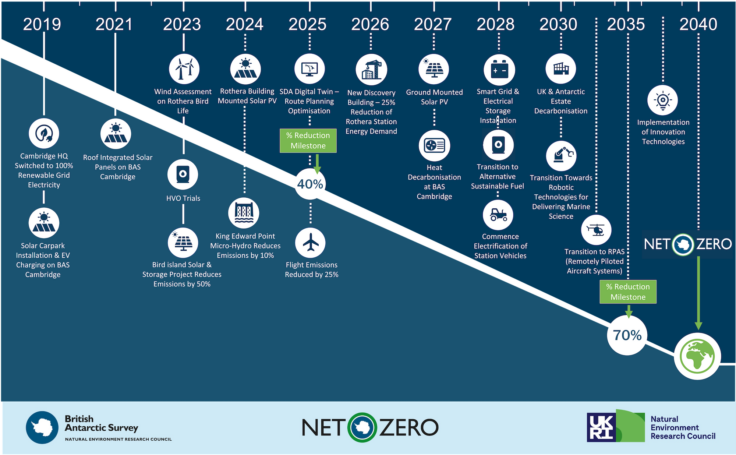
Committing to action with what’s possible now
The current phase of our Net Zero plan makes the most progress possible with new technologies in efficiency and energy production. At our research stations in Antarctica, we have implemented a substantial number of measures – from energy upgrades, renewable energy systems, and automation to, improved energy management practices.
Our largest Antarctic research station, Rothera, is undergoing major upgrades through the Antarctic Infrastructure Modernisation Programme (AIMP), which include a new energy efficient science and operations building and new energy services that are expected to deliver 25% reduction in carbon emissions. In parallel, we are at feasibility stage for expanding existing renewables and introducing energy and thermal storage systems to help us fully decarbonise the station.
At King Edward Point Research Station in South Georgia, a hydropower system is meeting 80% of the energy demands in heating and electricity since 2009 and we are currently introducing an additional micro-hydro turbine that will help us save an additional 10% of carbon emissions. Full decarbonisation is currently challenging as we need to use fuel to ensure the back-up energy systems are ready to be used if needed.
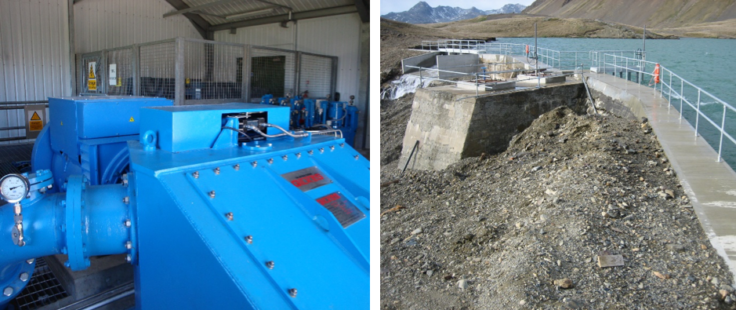
Halley VI Research Station has reduced fuel use and carbon emissions by nearly 75% through automating data collection during winter months, while rigorous energy management practices allow a small team to operate the station with minimum impact during the summer months.
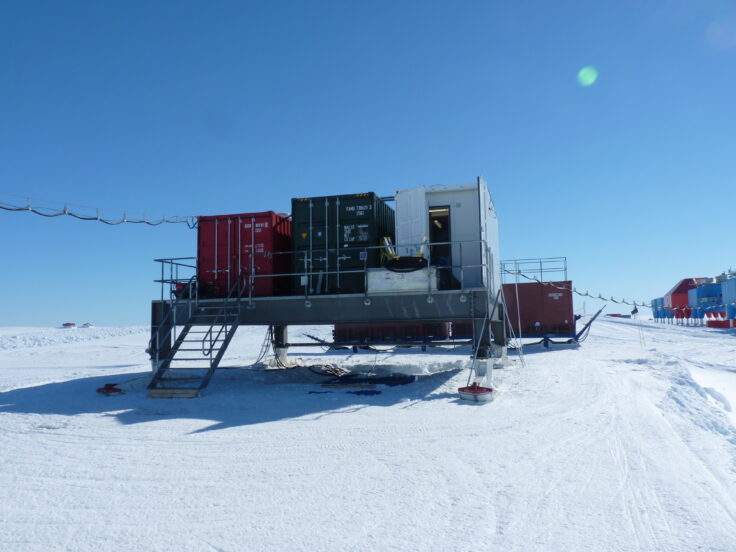
Meanwhile, at the research station at Bird Island in South Georgia, we are commissioning a solar and energy storage system to reduce fuel use and carbon emissions by 50% this season. This will also have a significant indirect carbon impact from reducing the demand for refuelling the station using our ship, the RRS Sir David Attenborough.
The same principles apply at our Cambridge headquarters, where we have been focusing on reducing energy demand through insulation improvements, upgrading energy systems and controls, and generating renewable energy.
Our solar carpark and solar roof systems are generating 30-40% of the annual electricity demand and during sunny summer days we can operate only on renewable energy generated on our site. We are currently working on a roadmap to fully decarbonise our heating while further improving the thermal performance of our buildings where possible.
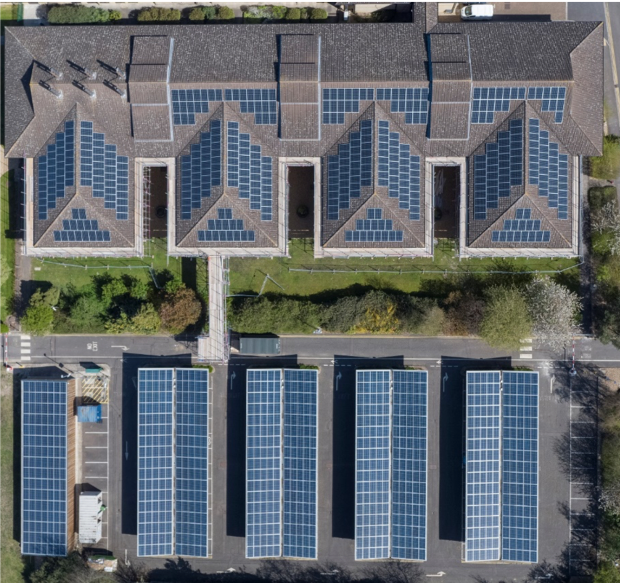
Understanding the role of future fuels
The progression towards renewable energy generation is a real positive in the journey towards decarbonisation, but the current reality is that some fuels remain essential in these inhospitable environments. The remoteness of the locations where we operate means we need robust and reliable primary and back-up energy systems, and our back-up systems currently rely on conventional energy generation systems that use fossil fuels.
However, as new alternative sustainable fuels are becoming more accessible, there could be low carbon solutions in the near future that would allow us to remove fossil fuels from Antarctic stations completely.
Looking at our wider operation, alternative sustainable fuels could also have a role to play in the short, medium or even long-term for our aircraft and ship, which are essential to delivering logistics and critical marine and airborne science.
Most recently, on our polar research vessel, the RRS Sir David Attenborough, we have begun trialing the use of Hydrotreated Vegetable Oil (HVO) with very promising results so far. After initial testing in summer 2023, the ship is now testing the fuel during season operations in the Southern Ocean. The use of HVO on the ship is expected to reduce carbon emissions by 29% by the end of 2023.
In addition, we are developing AI and machine learning tools that will to allow us to optimise planning of operations, logistics and science with the aim to reduce fuel use and carbon emissions.

Embracing and influencing systemic change
While these technologies are an essential part of achieving Net Zero, they will not get us there on their own. The scale of the climate challenge means we need to think about change at a more fundamental level, and really questioning how we deliver our science.
We are taking steps in this direction: to reduce the need for the fuel-intensive use of ships, we are investing into marine autonomy – allowing us to use the RRS Sir David Attenborough as a mothership. From there, a fleet of autonomous platforms are sent out to collect vital scientific data, minimising the distance the ship itself needs to travel; in some cases this is allowing scientists to collect longer-term data, and access places we might previously not have gone.
Likewise, to reduce the need for crewed aircraft, we are testing and deploying a range of drones to collect airborne data, and are using high-resolution satellite imagery. In January 2024, a team at Rothera Research Station will test the Windracers ULTRA uncrewed aerial vehicle – an autonomous, twin-engine, 10m fixed-winged aircraft – with the hope of significantly progressing our use of drone technology.
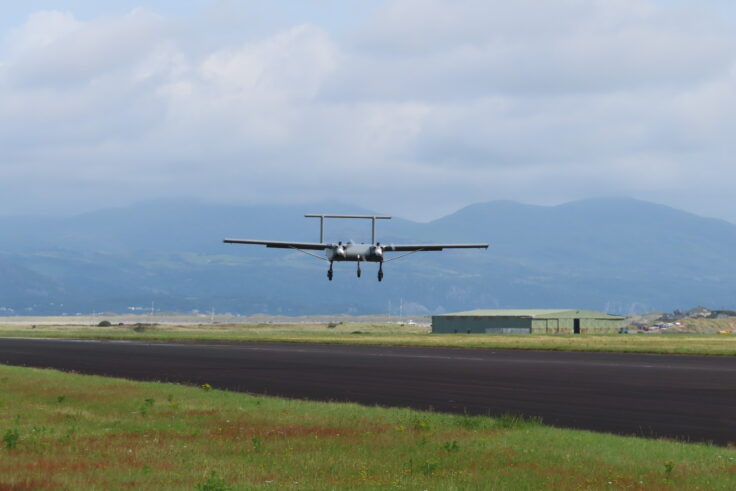
There’s a role for AI too – in optimising routes, predicting environmental conditions and identifying where additional data will add most value, to reduce the carbon intensity and frequency of journeys.
And vitally, we are tapping into the creativity, expertise and ingenuity of our own staff and our partners. We have instigated a Decarbonising Antarctica Discussion Forum with other national Antarctic operators to share experience and learn from each other, and are collaborating with Arctic partners to accelerate testing of novel renewable technologies in polar conditions.
Rising to the urgent challenge
The size of the challenge still ahead of is at BAS substantial. However, we have cause to be genuinely optimistic and motivated by the steps we have been able to take so far to decarbonise our operations, logistics and supply chains.
How can we rise to our carbon challenges, and how can you rise to yours?
For our scientists, this includes giving evidence at COP28, for our engineers, designing out the need for fossil fuels, for our procurement team, influencing our supply chains to embed sustainability and best carbon practice. We have found the Carbon Literacy Project a great help in growing a deeper understanding amongst our staff and designing individual action plans.
We desperately need the world leaders at COP28 to show ambition, vision and global stewardship, and take courageous decisions that will protect the interests of all present and future life on Earth.
However, it isn’t enough to wait for change at this level: we all need to cultivate the same quality of ambition, vision and courageous action. If we each take responsibility for climate action in our spheres of influence – professionally and personally – we will see the difference.
Find out more about our Net Zero strategy and how we plan to decarbonise our operations by 2040.